
In this edition of “I Wake Up Streaming,” novelist William Boyle rounds up his top streaming picks for the month of August. The column’s name is a play on the 1941 film I Wake Up Screaming, starring Betty Grable, Victor Mature, and Carole Landis. While the film’s title hits a pleasing note of terror and despair, changing that one letter speaks to the joy of discovering new films and rediscovering old favorites, as well as the panic that comes with being overwhelmed by options.
The Bikeriders (Peacock)
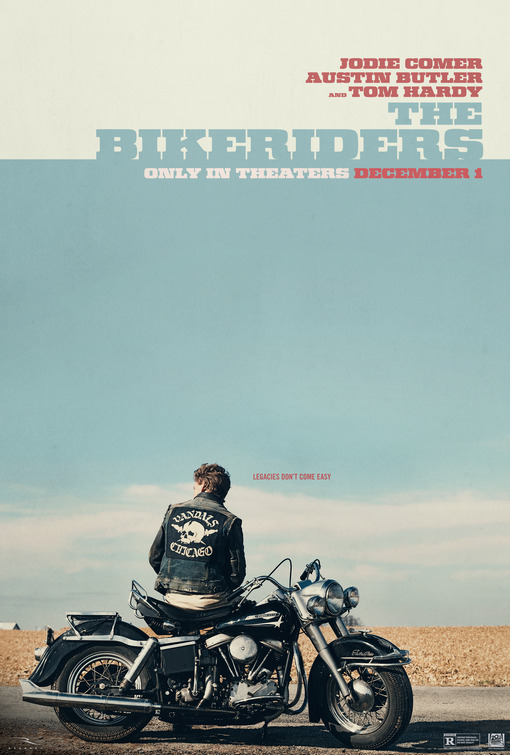 I’ve been a Jeff Nichols fan from the start. Shotgun Stories, Take Shelter, Mud, Midnight Special, and Loving are all movies I admire the hell out of. I’d heard mixed things about The Bikeriders, which dampened my enthusiasm to see it a bit, but I should’ve (to borrow a phrase from Vincent Vega) better fucking known better. It knocked me out. Tracking the rise and fall of a Chicago motorcycle club, the Vandals, it hits like a ’70s movie in many ways. It drifts beautifully but is also structured like a classic gangster narrative. It’s loaded with memorable performances. Jodie Comer (I’d somehow never seen her in anything before) is a revelation as Kathy Cross, who tells the story to Mike Faist’s Danny Lyon, a photographer chronicling the club. The movie is based on a book of photographs by the real-life Lyon, documenting a motorcycle gang known as the Chicago Outlaws. The interviews Lyon did with members of the Outlaws provide the framework for Nichols’s fictional reimagining of the story. Tom Hardy is at his madman best as club leader Johnny (there are echoes of Michael Cera’s Wally Brando from Twin Peaks: The Return in his performance), Austin Butler’s solid as Kathy’s husband, Benny, and Michael Shannon’s a joy as Zipco. I also dug the Will Oldham cameo. In the end, The Bikeriders feels kind of like a mix of Francis Ford Coppola’s Rumble Fish and Martin Scorsese’s Goodfellas by way of a Shangri-Las song. In other words, it’s right up my alley. The photography is stunning, as is the attention to detail. So many contemporary period movies look and feel wrong, but this nails everything. Probably my favorite movie of the year so far, though it’s got heavy competition with Jane Schoenbrun’s I Saw the TV Glow and my next pick.
I’ve been a Jeff Nichols fan from the start. Shotgun Stories, Take Shelter, Mud, Midnight Special, and Loving are all movies I admire the hell out of. I’d heard mixed things about The Bikeriders, which dampened my enthusiasm to see it a bit, but I should’ve (to borrow a phrase from Vincent Vega) better fucking known better. It knocked me out. Tracking the rise and fall of a Chicago motorcycle club, the Vandals, it hits like a ’70s movie in many ways. It drifts beautifully but is also structured like a classic gangster narrative. It’s loaded with memorable performances. Jodie Comer (I’d somehow never seen her in anything before) is a revelation as Kathy Cross, who tells the story to Mike Faist’s Danny Lyon, a photographer chronicling the club. The movie is based on a book of photographs by the real-life Lyon, documenting a motorcycle gang known as the Chicago Outlaws. The interviews Lyon did with members of the Outlaws provide the framework for Nichols’s fictional reimagining of the story. Tom Hardy is at his madman best as club leader Johnny (there are echoes of Michael Cera’s Wally Brando from Twin Peaks: The Return in his performance), Austin Butler’s solid as Kathy’s husband, Benny, and Michael Shannon’s a joy as Zipco. I also dug the Will Oldham cameo. In the end, The Bikeriders feels kind of like a mix of Francis Ford Coppola’s Rumble Fish and Martin Scorsese’s Goodfellas by way of a Shangri-Las song. In other words, it’s right up my alley. The photography is stunning, as is the attention to detail. So many contemporary period movies look and feel wrong, but this nails everything. Probably my favorite movie of the year so far, though it’s got heavy competition with Jane Schoenbrun’s I Saw the TV Glow and my next pick.
Love Lies Bleeding (Max)
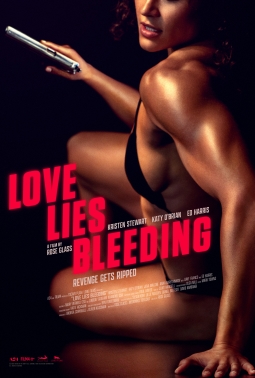 I loved Saint Maud, so I figured I’d be into whatever writer/director Rose Glass did next, but I sure as shit wasn’t expecting this bit of Harry Crews–meets-Bound-in-’80s–New Mexico madness. Glass co-wrote Love Lies Bleeding with Weronika Tofilska, and it’s an ambitious, wild, captivating ride. Kristen Stewart plays Lou, living a dead-end existence in a sweaty desert town, operating a gym, worrying over her abused housewife sister, Beth (Jena Malone), and avoiding contact with her old man, Lou Sr. (Ed Harris in creep mode), a crook who runs a gun range and gets into lots of other nasty business. Tension gets amped up when Jackie (Katy O’Brian, giving one of the most memorable performances of the year) rumbles into town, headed for a bodybuilding competition in Vegas. First, she hooks up with Lou’s shit-stain brother-in-law, JJ (an icky, grubby Dave Franco), gets a job at Lou Sr.’s gun range, and then meets Lou at the gym. For Lou, Jackie is exciting and dangerous and unlike everyone else she’s known. They fall hard for each other, their relationship instantly full of fireworks. It’s Lou who introduces Jackie to steroids, and things get weirder and darker and funnier from there. Love Lies Bleeding is a tight, strange, and desperate desert neo-noir with knockout performances (I should also mention Anna Baryshnikov, who steals every scene she’s in as the sad and aloof Daisy). Feels like a throwback to primo early ’90s entries in the genre. On my first viewing, I particularly loved the first half, but it kind of fell apart for me a little in the homestretch, though I still admired the big, gutsy swings it took. My second viewing confirmed that I was wrong, that the whole thing holds together beautifully, and I know it’s a movie I’ll revisit often.
I loved Saint Maud, so I figured I’d be into whatever writer/director Rose Glass did next, but I sure as shit wasn’t expecting this bit of Harry Crews–meets-Bound-in-’80s–New Mexico madness. Glass co-wrote Love Lies Bleeding with Weronika Tofilska, and it’s an ambitious, wild, captivating ride. Kristen Stewart plays Lou, living a dead-end existence in a sweaty desert town, operating a gym, worrying over her abused housewife sister, Beth (Jena Malone), and avoiding contact with her old man, Lou Sr. (Ed Harris in creep mode), a crook who runs a gun range and gets into lots of other nasty business. Tension gets amped up when Jackie (Katy O’Brian, giving one of the most memorable performances of the year) rumbles into town, headed for a bodybuilding competition in Vegas. First, she hooks up with Lou’s shit-stain brother-in-law, JJ (an icky, grubby Dave Franco), gets a job at Lou Sr.’s gun range, and then meets Lou at the gym. For Lou, Jackie is exciting and dangerous and unlike everyone else she’s known. They fall hard for each other, their relationship instantly full of fireworks. It’s Lou who introduces Jackie to steroids, and things get weirder and darker and funnier from there. Love Lies Bleeding is a tight, strange, and desperate desert neo-noir with knockout performances (I should also mention Anna Baryshnikov, who steals every scene she’s in as the sad and aloof Daisy). Feels like a throwback to primo early ’90s entries in the genre. On my first viewing, I particularly loved the first half, but it kind of fell apart for me a little in the homestretch, though I still admired the big, gutsy swings it took. My second viewing confirmed that I was wrong, that the whole thing holds together beautifully, and I know it’s a movie I’ll revisit often.
This Is Sparklehorse (Prime Video)
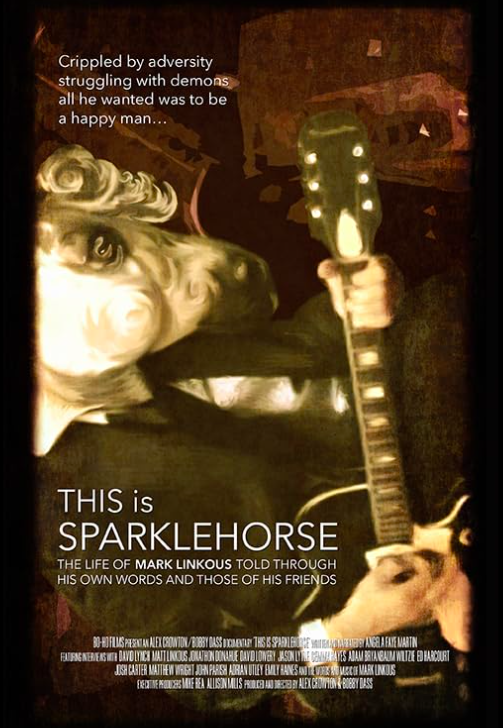 Mark Linkous’s music has meant so much to me for a long time now—almost thirty years. This Is Sparklehorse isn’t a biographical documentary, nor does it aim to be. It’s elliptical, fragmented, really more of an artistic portrait. Linkous has always been mysterious to me—I guess it’s fitting that his life is presented in something of an oblique, scrapped-together way. This is raw, broken, unpolished. Specifics are often skirted around. There’s incredible footage, and there are ample talking head interviews, some of them particularly good (David Lynch and David Lowery are wonderful to hear, while the dude from Mercury Rev is a bit much, tinkering with a piano, facing a wall in the shadows). I like that filmmakers Alex Crowton and Bobby Dass go through Linkous’s whole (brief) discography (except for the posthumously released Bird Machine, which probably came out after this was made). It doesn’t fall into the trap of so many contemporary music docs (there’s some animation, but it fits, and there’s not an overabundance of it). The poetic narration by Angela Faye Martin is sincere and often lovely—it feels like stream-of-consciousness liner notes. I love that David Lynch just refers to Linkous as Sparklehorse like it’s his name. I also love that Linkous gets framed as an artist of the same caliber as his heroes, Frank Stanford, Breece D’J Pancake, and Vic Chesnutt. Would’ve liked to see his admiration for and friendship with Chesnutt explored in greater depth, especially since it was Chesnutt’s passing that set Linkous down the darkest road. Still, very thankful this exists.
Mark Linkous’s music has meant so much to me for a long time now—almost thirty years. This Is Sparklehorse isn’t a biographical documentary, nor does it aim to be. It’s elliptical, fragmented, really more of an artistic portrait. Linkous has always been mysterious to me—I guess it’s fitting that his life is presented in something of an oblique, scrapped-together way. This is raw, broken, unpolished. Specifics are often skirted around. There’s incredible footage, and there are ample talking head interviews, some of them particularly good (David Lynch and David Lowery are wonderful to hear, while the dude from Mercury Rev is a bit much, tinkering with a piano, facing a wall in the shadows). I like that filmmakers Alex Crowton and Bobby Dass go through Linkous’s whole (brief) discography (except for the posthumously released Bird Machine, which probably came out after this was made). It doesn’t fall into the trap of so many contemporary music docs (there’s some animation, but it fits, and there’s not an overabundance of it). The poetic narration by Angela Faye Martin is sincere and often lovely—it feels like stream-of-consciousness liner notes. I love that David Lynch just refers to Linkous as Sparklehorse like it’s his name. I also love that Linkous gets framed as an artist of the same caliber as his heroes, Frank Stanford, Breece D’J Pancake, and Vic Chesnutt. Would’ve liked to see his admiration for and friendship with Chesnutt explored in greater depth, especially since it was Chesnutt’s passing that set Linkous down the darkest road. Still, very thankful this exists.
Kansas City Confidential (Criterion Channel, Prime Video, Tubi)
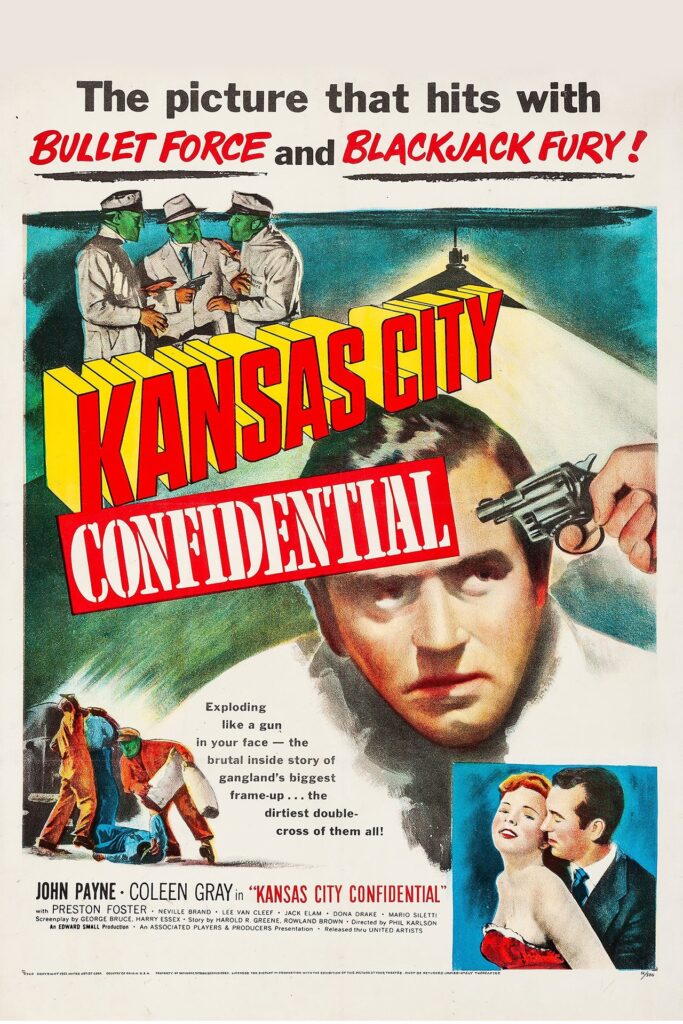 I saw this first when I was about fourteen after hearing it was a major influence on Reservoir Dogs. Watched it again in my mid-twenties. Loved it both times. I’ve now revisited it while working my way through all of director Phil Karlson’s filmography. A crook gets together a band of outlaws for a bank heist. They wear masks, never knowing each other’s identities. Only the boss knows who’s involved, thinking if anyone gets pinched, they can’t fold. He’s thought through everything—got a perfect crime lined up. It goes off without a hitch, except for the unwitting delivery guy, Joe (John Payne), who gets fingered for the robbery by the cops. Eventually, he’s cleared, but not before his name and picture are all over the papers. He sets out for revenge, going after the gang. The movie doesn’t hit a wrong beat. I appreciated it in new ways this most recent viewing. Those masks! Those shadows and that smoke! Those voices and faces! Coleen Gray! All the brooding and sweating! Of the sixteen Karlson movies I’ve watched in this three-week run—about half rewatches, the rest first-time viewings—this one’s the biggest masterpiece of the bunch.
I saw this first when I was about fourteen after hearing it was a major influence on Reservoir Dogs. Watched it again in my mid-twenties. Loved it both times. I’ve now revisited it while working my way through all of director Phil Karlson’s filmography. A crook gets together a band of outlaws for a bank heist. They wear masks, never knowing each other’s identities. Only the boss knows who’s involved, thinking if anyone gets pinched, they can’t fold. He’s thought through everything—got a perfect crime lined up. It goes off without a hitch, except for the unwitting delivery guy, Joe (John Payne), who gets fingered for the robbery by the cops. Eventually, he’s cleared, but not before his name and picture are all over the papers. He sets out for revenge, going after the gang. The movie doesn’t hit a wrong beat. I appreciated it in new ways this most recent viewing. Those masks! Those shadows and that smoke! Those voices and faces! Coleen Gray! All the brooding and sweating! Of the sixteen Karlson movies I’ve watched in this three-week run—about half rewatches, the rest first-time viewings—this one’s the biggest masterpiece of the bunch.
Willard (1971) and Ben (1972) (Prime Video, Kanopy, Peacock, Tubi, VUDU)
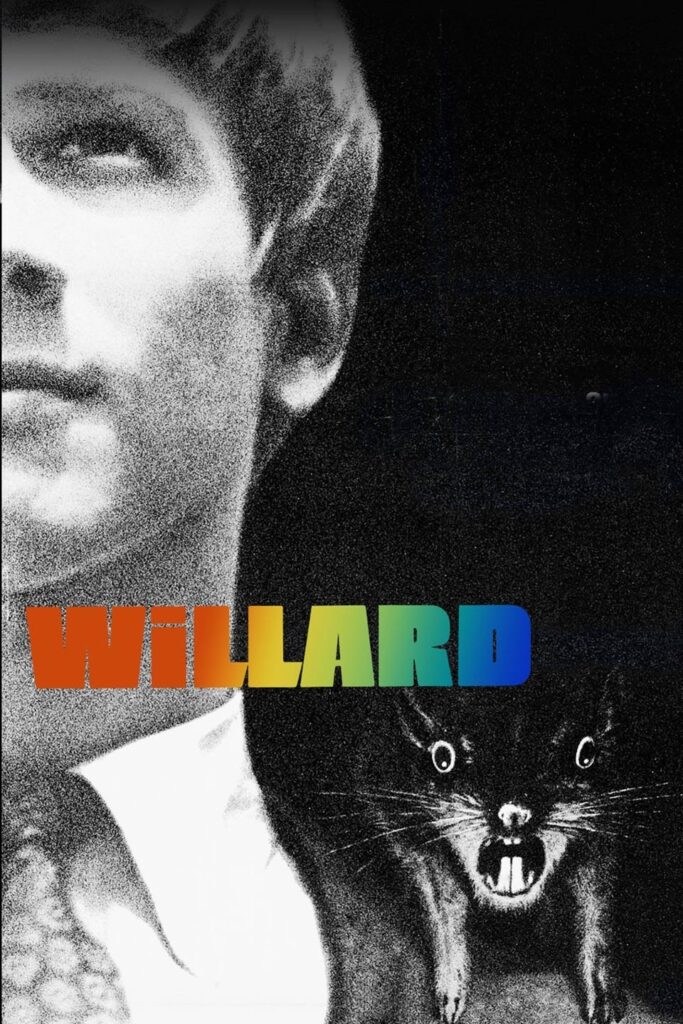 I’m going through Phil Karlson’s filmography, as I said, and I knew I’d get to Ben, which is unlike the rest of his output. Karlson directed some westerns in the ’40s and ’50s (Gunman’s Walk is one that’s particularly great), but he’s primarily remembered now for his crime pictures (the aforementioned Kansas City Confidential, 99 River Street, Scandal Sheet, The Phenix City Story, The Brothers Rico, 5 Against the House, his Untouchables pilot The Scarface Mob). In the ’60s, he started drifting across genre lines, doing—what I assume—was often work for hire, directing hospital drama The Young Doctors, two of Dean Martin’s goofy Matt Helm spy movies, an Elvis movie, a surf movie, and more. And he wound up doing some really interesting work in the twilight of his career, Ben (the horror-adjacent follow-up to Daniel Mann’s Willard) being one example and Walking Tall being another. I’d never seen Willard, so I watched that first and was blown away. (I also immediately ordered the novel it’s based on, Stephen Gilbert’s Ratman’s Notebooks, recently reissued by Valancourt). Willard is a strange masterpiece. Bruce Davison plays the title character, a young man who befriends a group of rats and then uses the rats as agents of vengeance on those who have done him wrong. Davison plays Willard with empathy and restraint. Ben is different tonally, but it’s almost just as good and a little weirder. Lee Montgomery is terrific as young Danny, who befriends Ben, the leader of the rats, and Karlson does interesting things that set the stage for a certain brand of ’70s horror. Crazy that Karlson made Ben twenty years after Kansas City Confidential—I love the varied filmographies of these great old workhorse directors whose careers spanned such wildly different eras.
I’m going through Phil Karlson’s filmography, as I said, and I knew I’d get to Ben, which is unlike the rest of his output. Karlson directed some westerns in the ’40s and ’50s (Gunman’s Walk is one that’s particularly great), but he’s primarily remembered now for his crime pictures (the aforementioned Kansas City Confidential, 99 River Street, Scandal Sheet, The Phenix City Story, The Brothers Rico, 5 Against the House, his Untouchables pilot The Scarface Mob). In the ’60s, he started drifting across genre lines, doing—what I assume—was often work for hire, directing hospital drama The Young Doctors, two of Dean Martin’s goofy Matt Helm spy movies, an Elvis movie, a surf movie, and more. And he wound up doing some really interesting work in the twilight of his career, Ben (the horror-adjacent follow-up to Daniel Mann’s Willard) being one example and Walking Tall being another. I’d never seen Willard, so I watched that first and was blown away. (I also immediately ordered the novel it’s based on, Stephen Gilbert’s Ratman’s Notebooks, recently reissued by Valancourt). Willard is a strange masterpiece. Bruce Davison plays the title character, a young man who befriends a group of rats and then uses the rats as agents of vengeance on those who have done him wrong. Davison plays Willard with empathy and restraint. Ben is different tonally, but it’s almost just as good and a little weirder. Lee Montgomery is terrific as young Danny, who befriends Ben, the leader of the rats, and Karlson does interesting things that set the stage for a certain brand of ’70s horror. Crazy that Karlson made Ben twenty years after Kansas City Confidential—I love the varied filmographies of these great old workhorse directors whose careers spanned such wildly different eras.
William Boyle is the author of the novels Gravesend, The Lonely Witness, A Friend Is a Gift You Give Yourself, City of Margins, Shoot the Moonlight Out, and Saint of the Narrows Street (coming in February 2025 from Soho Crime). His novella Everything Is Broken was published in Southwest Review Volume 104, numbers 1–4, and he co-edited (with Claudia Piñeiro and Frances Riddle) the noir issue (Volume 108, number 3). His website is williammichaelboyle.com.
Illustration: Jess Rotter
